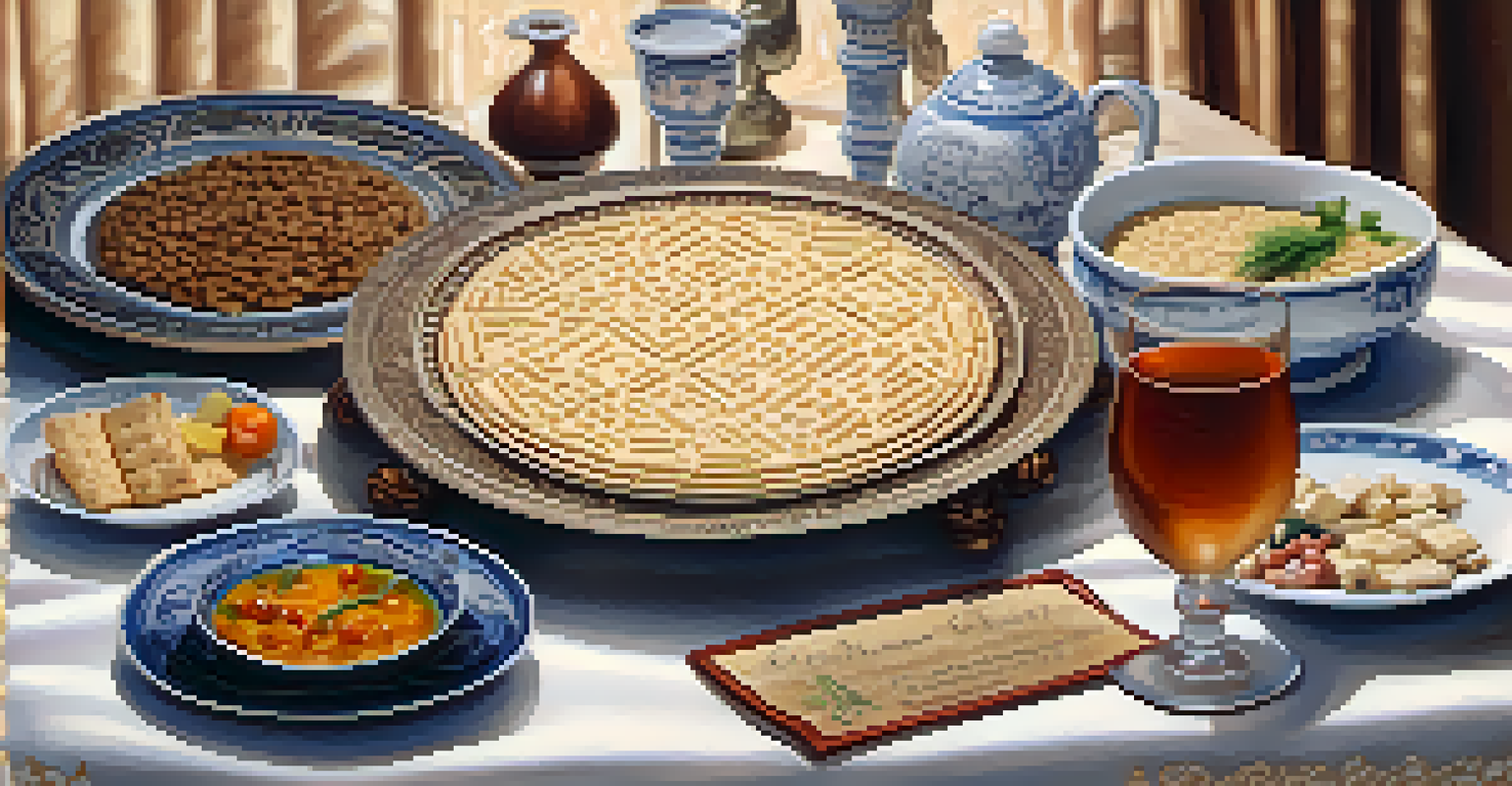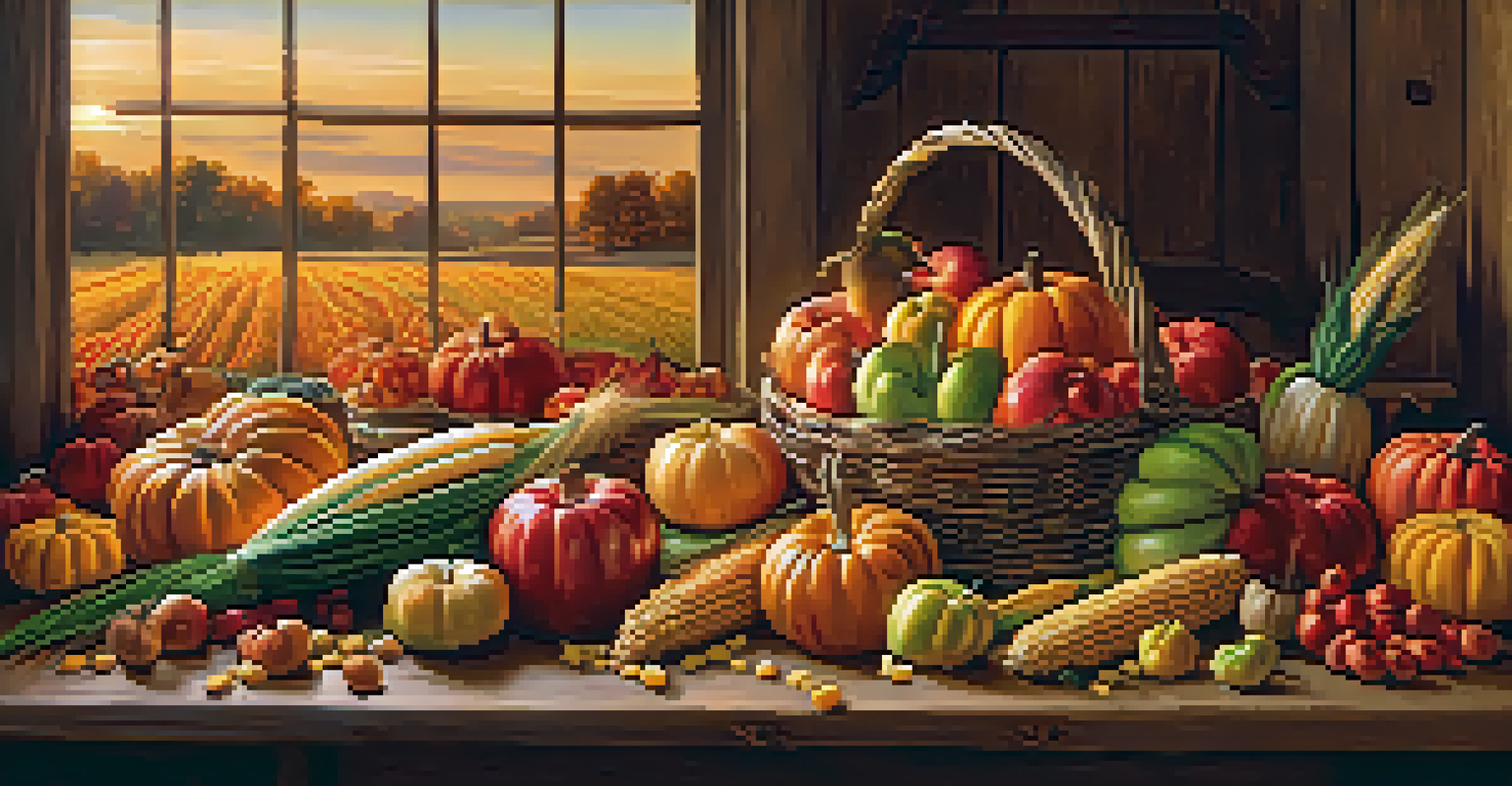Food as Ritual: The Spiritual Significance of Culinary Traditions

Understanding Food as a Spiritual Connection
Food is more than mere sustenance; it often serves as a bridge to spirituality. Across cultures, meals can signify unity, reflecting shared beliefs and values. When we gather around a table, we forge connections not only with each other but also with our ancestors and traditions.
Food is our common ground, a universal experience.
Consider a family gathering during a holiday feast. Each dish carries a story, evoking memories of past celebrations and honoring those who came before us. Through these culinary rituals, we celebrate life and acknowledge the presence of spirit in our everyday experiences.
In this way, food becomes a medium through which we express gratitude and reverence. It invites us to pause, reflect, and appreciate the blessings we have, deepening our relationship with both our loved ones and the universe.
Culinary Traditions Across Cultures
Different cultures have unique culinary traditions that reflect their spiritual beliefs. For instance, in many Asian cultures, rice is more than a staple; it’s considered sacred, symbolizing life and fertility. The rituals surrounding its preparation and consumption often involve prayers or blessings, creating a spiritual atmosphere.

Similarly, in Mediterranean cultures, meals are often communal, emphasizing the importance of sharing and togetherness. These gatherings can become sacred events, where food serves not just as nourishment but as a way to connect with others and the divine.
Food as a Spiritual Connector
Food serves as a bridge to spirituality, fostering connections with our loved ones and traditions.
By exploring these diverse rituals, we can gain insight into how food shapes our spiritual identities. Each tradition offers a glimpse into the values and beliefs that define a culture, reminding us of our shared humanity.
Rituals That Mark Life’s Milestones
Food plays a crucial role in life’s significant moments, marking milestones such as births, weddings, and funerals. Each event carries its own set of culinary traditions that enhance the experience and provide comfort. For example, cake cutting at weddings symbolizes the couple’s first act of sharing, an act imbued with love and commitment.
The act of cooking is a way to express love for those we feed.
In many cultures, certain foods are prepared to welcome a newborn, with recipes passed down through generations. These rituals serve to honor life, create bonds, and provide a sense of continuity amidst change.
Even during times of grief, food can offer solace. The sharing of a meal during a wake or memorial service not only nourishes the body but also fosters community support, helping individuals navigate their loss together.
The Role of Food in Religious Practices
Religious practices often incorporate food as a central element, reinforcing beliefs and fostering community. In Christianity, for example, the act of communion involves sharing bread and wine, symbolizing the body and blood of Christ. This ritual transforms a simple meal into a profound spiritual experience.
In Judaism, the Passover Seder is rich with symbolic foods that narrate the Exodus story. Each item on the plate serves as a reminder of struggle and liberation, inviting participants to reflect on their history and faith.
Culinary Traditions and Identity
Different cultures use unique culinary practices to express their spiritual beliefs and preserve their identities.
These food rituals not only enhance religious observance but also strengthen communal ties, as participants come together to share in the spiritual significance of their meals.
Seasonal Foods and Their Symbolism
Seasonal foods often carry deep spiritual meanings, connecting us to the rhythms of nature. Harvest festivals, for instance, celebrate the bounty of the earth, with feasts that honor the cycle of life. Eating foods that are in season encourages gratitude for what the land provides and reminds us of our dependence on nature.
In many cultures, certain foods are prepared only during specific seasons or festivals, further emphasizing their significance. For example, pumpkin pie during Thanksgiving in the United States symbolizes gratitude and abundance.
By embracing seasonal eating, we not only nourish our bodies with fresh ingredients but also cultivate a deeper appreciation for the earth’s gifts, enhancing our spiritual connection to the world around us.
The Therapeutic Power of Cooking and Eating
Cooking and eating can be therapeutic, providing a sense of calm and mindfulness. The act of preparing a meal can become a meditative practice, where the rhythm of chopping vegetables or stirring a pot allows for reflection and presence in the moment. This mindfulness can lead to a deeper appreciation for the food we consume.
Moreover, sharing a meal with loved ones fosters connection and nurtures relationships, serving as a reminder of our shared humanity. It’s during these moments that we can engage in meaningful conversations and create lasting memories.
Food's Role in Life Milestones
Meals are integral to life events, providing comfort and a sense of community during significant moments.
Ultimately, the simple act of cooking and eating can become a ritual that promotes not only physical nourishment but also emotional and spiritual well-being.
Food as a Means of Cultural Preservation
Food plays a pivotal role in cultural preservation, acting as a vessel for traditions and stories. Recipes passed down through generations encapsulate history, values, and communal identity. By preparing and sharing traditional dishes, we keep our cultural heritage alive, even as the world around us changes.
For immigrant communities, food becomes a powerful way to maintain connections to their homeland. Meals often evoke memories of family gatherings, cultural celebrations, and cherished moments, bridging the gap between past and present.

In this way, culinary traditions serve as a form of resistance against cultural erasure, reminding us of who we are and where we come from. Every bite carries the essence of our heritage, making food a vital component of our collective identity.